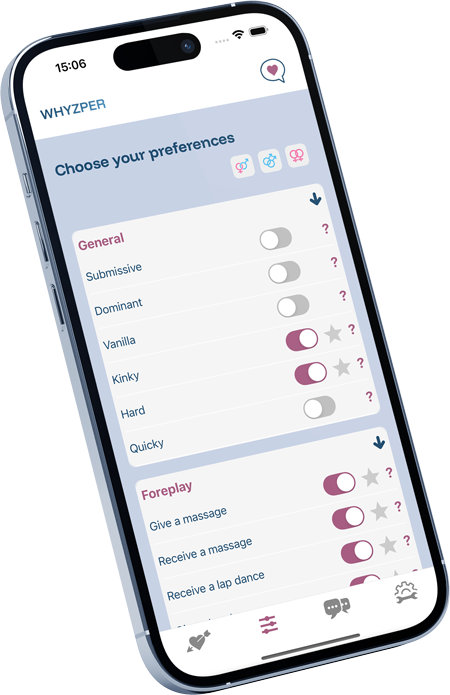It’s a typical evening together. You want to say what you truly desire—but every time you try, a tight, uneasy feeling creeps in.
What if your partner rejects you, feels embarrassed, or completely misunderstands what you mean?
So you stay quiet. But the desire doesn’t go away—it lingers, unspoken, between you. And slowly, you start to feel unseen.
Sound familiar? Do you sometimes feel like you can’t openly say what you want—especially when it comes to intimacy? You’re not alone. Many couples struggle to talk about their sexual desires. But the good news is: it doesn’t have to stay that way.
In this article, you’ll find practical, easy-to-follow tips that can help you talk to your partner about your desires—without pressure, awkwardness, or fear.
New to Whyzper? Discover how our app helps couples deepen their connection. Learn more about Whyzper!
1. Why is it so hard to talk about sexual desires?
Many people struggle to speak openly about their sexual desires.
It’s not that couples don’t want to communicate—often, it’s shame, fear, and social expectations that get in the way.
Shame and fear of rejection
Few things feel as personal—and vulnerable—as our sexual needs. That’s why the fear of being judged or rejected is so powerful.
Thoughts like “What if my partner thinks I’m weird?” keep us silent.
This fear alone makes it incredibly difficult to bring up what we really want.
Worrying about damaging the relationship
Many people are afraid that expressing sexual desires might make things worse.
They think: “What if I come across as dissatisfied or demanding?”
But in reality, unspoken desires often create far more distance over time than an honest, caring conversation ever would.
Social taboos and outdated beliefs
On top of that, many of us carry outdated beliefs like “You just don’t talk about sex.”
These cultural messages run deep—but they’re misleading.
In truth, it’s not only normal, but healthy to talk about your desires. It’s a sign of trust and emotional intimacy.
So yes—it’s completely understandable that talking about sexual needs feels difficult.
But it’s also something you can learn.
The first step is to recognize why it feels so hard—and to know you’re not alone in that.
2. When is the right time to talk about sexual desires?
Talking about your desires takes trust—but also good timing.
When and where you choose to have the conversation can make a big difference in how open and relaxed your partner feels.
Not in bed (and not right before or after sex)
It might seem like the obvious moment—but right before, during, or just after sex is rarely the best time to bring up new desires.
That’s when both of you are more emotionally exposed, and your words could be misunderstood as criticism.
It’s much better to separate the conversation from the act itself.
A neutral, relaxed setting
Choose a space where you both feel safe and comfortable—maybe on the couch during a quiet evening, on a walk, or while doing something casual together.
A neutral environment helps keep the conversation light, without added pressure or tension.
Take your time—no rush
This kind of conversation needs space. Don’t try to squeeze it in between appointments or right before bed.
If one of you is stressed, tired, or distracted, it’s harder to be present and understanding.
So, when should you talk about sexual desires?
Whenever both of you feel calm, connected, and unrushed.
A safe atmosphere and good timing can make all the difference.

Ready to explore your desires together?
Whyzper lets you share your sexual desires playfully and without pressure – privately and only when both partners agree.
Download Whyzper for free3. How to express your sexual desires without hurting your partner
One of the biggest fears when bringing up sexual desires is that your partner might feel hurt, criticized, or pressured. But with the right words and tone, you can express your needs in a way that feels positive, respectful, and inviting.
Use “I” statements instead of criticism
Rather than pointing out what’s lacking or what you don’t like, focus on what you’d love to experience.
This helps avoid defensiveness and keeps the conversation centered on your personal desires—not your partner’s “performance.”
✅ “I’d really like to try what it feels like when we…”
✅ “I’m curious about exploring this with you…”
✅ “Lately I’ve been wanting to try something new together—do you think you’d be open to that?”
Keep it positive and focus on shared experiences
The best way to talk about sexual desires is to frame them as something you want to explore together, not as a complaint or demand. Avoid phrases like “I find it boring” and instead highlight what could be exciting or meaningful for both of you:
✅ “I think this could be exciting for both of us.”
✅ “I love the idea of discovering something new together.”
✅ “It would be amazing for me if we could explore what brings us both joy.”
Show empathy and offer reassurance
Especially with sensitive topics, it helps to acknowledge that your partner might need time to process. Showing understanding reduces pressure and opens the door for honest exchange:
✅ “I totally get it if this feels new or unfamiliar—honestly, I feel a little nervous too, but I trust you.”
✅ “It’s completely okay if you want to take some time to think about it.”
✅ “There’s no rush—we can take it slow and figure out what feels good for both of us.”
By using kind, clear, and emotionally safe language, you create space for honest dialogue.
Your partner will be more likely to open up, reflect, and maybe even share their own desires—knowing they’re not being judged.
4. What if your partner reacts negatively or feels uncomfortable?
Sometimes the conversation about sexual desires doesn’t go the way you hoped.
Your partner might respond with discomfort, hesitation—or even rejection.
So how do you deal with a negative reaction to your sexual desires?
Show understanding—and don’t push for immediate agreement
The first step is to accept your partner’s reaction without pressure.
Calm, empathetic responses can help prevent things from escalating:
✅ “It’s totally okay if this surprises you—I just wanted to open up about it.”
✅ “I understand this might be new for you. We don’t need to rush anything.”
✅ “Take your time to think about it. It’s completely fine if you need space for now.”
Don’t take rejection personally
A hesitant or negative reaction usually has more to do with your partner’s own feelings, insecurities, or experiences than with you.
Try not to see it as a personal rejection—but as an honest emotional signal:
✅ “Just because they’re unsure right now doesn’t mean my desire is wrong.”
✅ “The first response doesn’t have to be the final answer—sometimes people just need time.”
Stay open: suggest compromises and gentle starting points
A “no” doesn’t necessarily mean “never.” There may still be room to explore a softer version of your desire—together:
✅ “Maybe we can just talk about what feels good for both of us.”
✅ “Would you prefer to ease into it slowly and just see how it feels?”
✅ “Let’s see if we can find a version of this that makes us both feel safe and excited.”
With openness, patience, and true understanding, even a difficult conversation can become a turning point—and lead to deeper intimacy than you expected.
5. Digital tools: How apps can help you talk about sexual desires
Talking about sexual needs can feel awkward—and that’s exactly where digital tools can help.
Apps can give couples a new and more comfortable way to connect—especially when words are hard to find.
How apps like Whyzper can support your conversation
Apps offer one big advantage: a neutral, discreet, and pressure-free environment to open up about sensitive topics. They help you:
-
Start conversations with helpful prompts—no awkward wording required
-
Communicate discreetly, without the pressure of saying it all out loud
-
Share desires gently, without risking direct confrontation
FlowSync & matching: a gentle way to explore intimacy
Whyzper was designed to help couples express intimate desires playfully, safely, and without pressure:
-
FlowSync lets each of you privately indicate whether you’re in the mood for connection.
One partner is only notified when both say yes—no pressure, no rejection. -
Desire Matching: Each partner selects what they’d like to explore.
A desire only appears if both partners express interest—so communication stays respectful and safe.
Why digital tools are ideal for “hard” conversations
Apps like Whyzper are especially useful for emotional or vulnerable topics because they:
-
Lower emotional barriers and reduce fear through a safe, semi-anonymous format
-
Help initiate difficult conversations gently
-
Prevent misunderstandings or blame spirals
Apps can’t replace honest conversations—but they can help you find the words, set the tone, and create a space where both partners feel heard and safe.
Final thoughts: Speaking your desires takes courage—but it’s worth it
It takes courage to talk openly about your sexual desires—but that courage is often the key to deeper connection.
Conversations like this rarely lead to distance—in fact, they often bring couples closer.
And yes, feeling unsure or vulnerable is completely normal.
These are delicate topics, and it’s okay to feel nervous.
But you don’t have to do it alone. Even small steps can make a big difference in how you communicate with your partner.
And if you’re struggling to find the right words, tools like Whyzper can help you explore and express your desires—discreetly, playfully, and without pressure.





